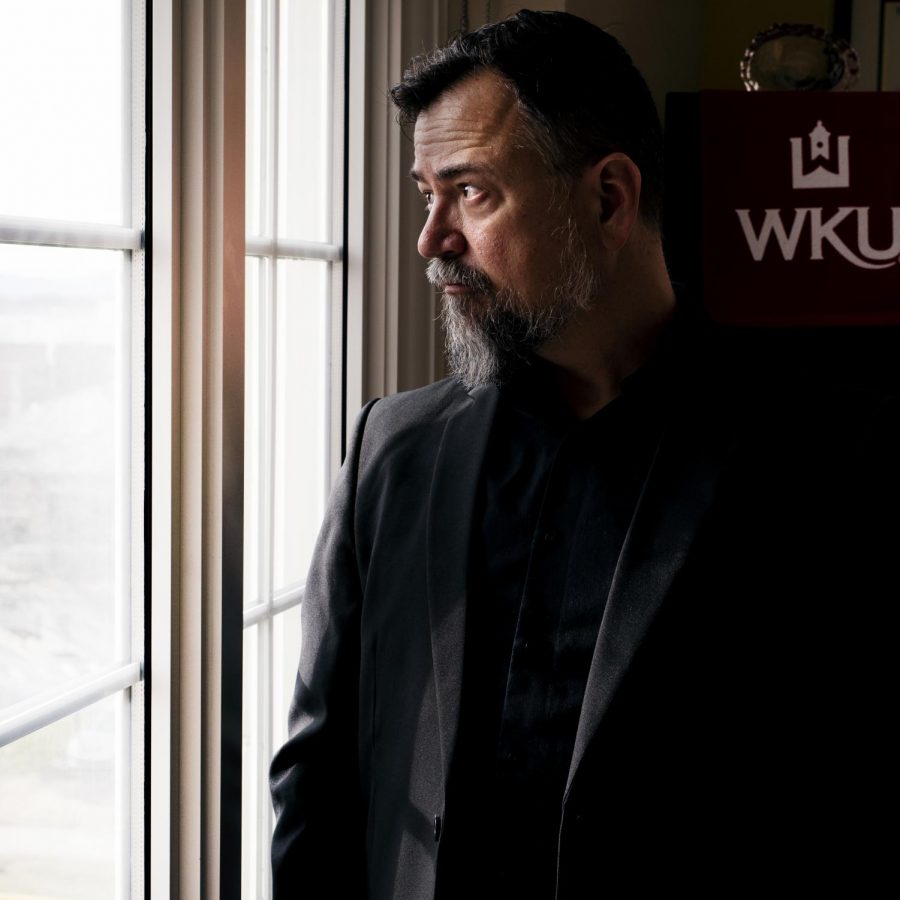How one educator is working to influence education through a conservative think-tank
January 26, 2021
WKU has always been near and dear to the heart of Gary Houchens.
As a teenager from Scottsville, Houchens came to the Hill for middle and high school music festivals.
“The campus was just sort of a gathering place for a lot of different community activities,” Houchens said. “Bowling Green and WKU were always sort of an important peripheral part of my life.”
Houchens originally studied journalism at WKU and was a staff member at the College Heights Herald. He graduated with a bachelor’s degree in philosophy, religion and history in 1993.
“My aspiration at the time was to be a college professor, although I imagined doing that in the field of religious studies and in ethics,” Houchens said.
Houchens attended graduate school to study theology and religious ethics, but felt a calling towards a career in K-12 education. After becoming a certified social studies teacher, Houchens picked up his first teaching assignment at Drakes Creek Middle School in Bowling Green.
“Fairly early on, I had people telling me as a young teacher that I had the skills to be a good principal,” Houchens said.
Houchens struggled envisioning himself as a principal, but after he and his wife moved to Evansville, Indiana, he found a job as an assistant principal. Houchens would go on to climb the administrative ladder. He returned to Kentucky as a district administrator for Simpson County Schools, and during his seven-year tenure there received a doctorate in educational leadership and organizational development from the University of Louisville in 2008.
Houchens considered teaching education administration at the university level while pursuing his doctorate. After teaching education administration courses at WKU as
a part-time instructor, he joined the Department of Education Administration, Leadership, and Research faculty full-time in 2010.
“It’s just a joy for me to be a teacher and professor at my campus,” Houchens said.
Houchens taught current Meade County Superintendent Mark Martin multiple times before Martin received his doctorate in 2019. He said Houchens is passionate about student success and equity.
“He wants all students, no matter their background or their ability levels, to have access to a great education and access to core instruction that gets students thinking,” Martin said.
As an instructor, Houchens motivated his students without being demeaning to them, Martin said.
Sara Jennings, one of Houchens’ current doctoral students, said Houchens wants his students to become effective school leaders.
“He just has so much respect for his students, and he really treats you like a professional,” Jennings said. “I think his expectations are high, and his classes are rigorous so you actually really learn a lot in Dr. Houchens’ courses.”
From 2016 to 2019, Houchens was a member of the Kentucky Board of Education, which sets education policy for the state’s public school districts.
“It was probably my highest professional honor to serve Kentucky’s students in that capacity, and I’m very grateful for the good work we accomplished during my tenure,” Houchens said.
Houchens is currently a member of the Conservative Education Reform Network, an organization within a Washington D.C.-based political think tank known as the American Enterprise Institute. Houchens said the network works together to articulate what modern conservative education policy should look like.
“I think there’s a belief that conservatives in many cases have had too narrow a view of the education issue,” Houchens said. “Conservatives have far more to offer on education issues and debates than just saying no to the federal government’s involvement.”
Houchens said conservatives have increasingly focused on changing curriculum standards at the state and local levels. Teachers have become increasingly frustrated by a lack of sufficient curriculum materials, so the internet has become a resource for finding materials, he said.
At WKU, conservative educators are allowed to openly share their views, Houchens said. When sharing his views with colleagues and university administrators, his experiences have “been nothing but positive.”
Houchens believes conservative educators from other universities might face different circumstances. There have been instances when the perspectives of conservative-minded educators have been delegitimized by their progressive counterparts, he said.
“I see this in the education realm where it is suggested that if you believe in school choice, you must hate public schools,” Houchens said. “Or if you believe in pension reform, you must be anti-teacher.”
Leo Bertucci can be reached at [email protected] Follow him on Twitter @leober2chee.
























